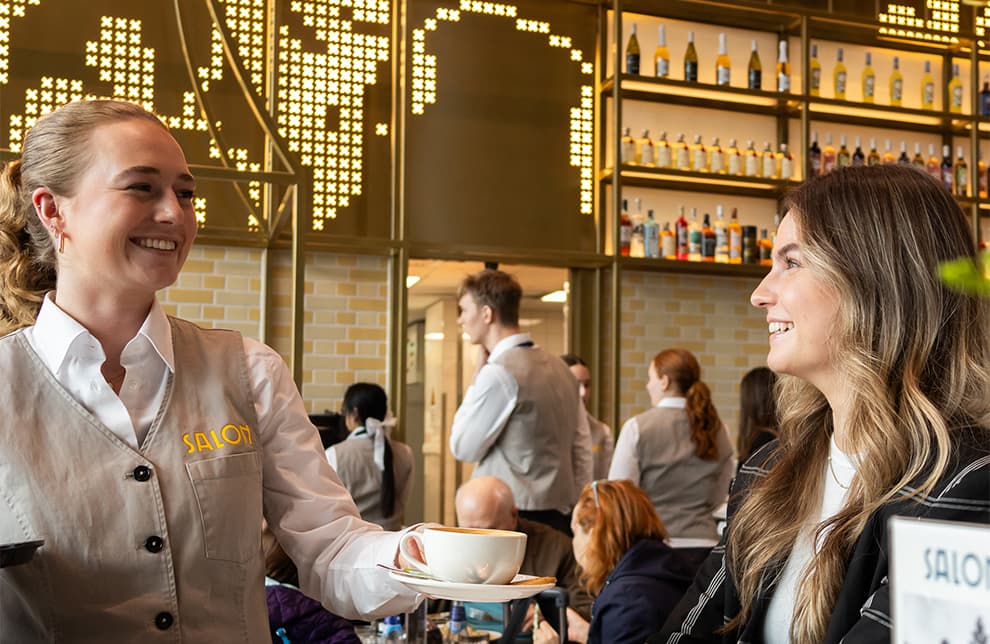Schiphol and partners: Making the f&b offering more sustainable
As a central hub for world travelers, Schiphol connects people with the world. Now and in the future. Schiphol has the ambition to be leading in society. We want everyone to feel welcome and to exceed every guest’s expectation. Together with our F&B Business Partners, we have the objective to offer a high-quality, diverse, recognizable and increasingly sustainable Food & Beverage experience. We are committed to reducing emissions in the supply chain by expanding the plant-based F&B offerings, prioritizing people, animals, and nature in our food and beverage procurement, and working towards a waste-free airport by 2030.
Find here the steps we are taking together with our partners1:

The more responsible choice always within reach
- Goal: 60% of the food and dairy offerings will be plant-based by 2030, based on ingredient volume.
- Goal: 50% CO2e reduction across the entire food offering by 2030 compared to 2023, measured in CO2e per kg product
The F&B outlets at Schiphol are committed to a 50% reduction in CO2e by 2030 compared to 2023 (measured in CO2e per kg of product). A crucial measure for this is increasing the plant-based offering of food and dairy to 60% by 2030 (based on ingredient volume), without compromising on the high quality and diversity of offerings and aiming to continue to provide passengers with an optimal hospitality experience. Schiphol and F&B Business Partners nudge consumers, for instance with appealing product presentations, to choose more responsibly. Consumers will see the menus expanded with high-quality plant-based options. By approaching this expansion step-by-step with our F&B Business Partners, we keep the prices of our F&B offerings stable, avoiding significant and sudden price increases.
More responsible and conscious procurement for people, animals, and nature
- By 2025, all products offered at Schiphol will be certified deforestation-free, in line with legislation.
- Coffee & cocoa are sourced with a FairTrade certification in 2025.
- Fish is sourced with an MSC/ASC certification in 2025
- 70% of animal protein sourced is 3 Stars Beter Leven (or international equivalent) in 2030.
The F&B outlets at Schiphol have to take responsibility for the entire F&B-chain. This means that they are responsible for reducing and avoiding adverse impact on people, animals, and nature. The F&B outlets at Schiphol identify four major and impactful product groups for ingredient procurement: animal protein (meat), fish, cocoa & coffee, and fruits & vegetables. For each of these groups,
Schiphol F&B opts for independent certifications. Additionally, in line with legislation, we will procure all products deforestation-free by 2025. Each product group has specific goals that are tightened annually, such as coffee & cocoa sourced with a FairTrade certification in 2025, fish sourced with an MSC/ASC certification in 2025, 70% of animal protein sourced with 3 Stars Beter Leven (or international equivalent) in 2030. By using a step-by-step approach with our F&B Business Partners, we avoid a sudden and significant price increase.
Let’s reduce, reuse and recycle together
- Goal: Zero waste by 2030, meaning a resource loss of less than 1%.
Schiphol aims to be a zero-waste airport and to ensure a resource loss of less than 1% by 2030. Zero waste means reducing the amount of waste so that less than 1% is incinerated or landfilled. As much as possible, current waste is reduced before it enters the airport, and the remainder is given a second life. Within waste we distinguish two streams, the operational waste stream and the constructional one. For the first stream Business Partners will contribute by rethinking packaging materials by the right purchasing of it, focusing on reducing food waste during preparation. Schiphol increasingly focuses on using recycled materials that can be reused. Schiphol commits to using rPET bottles in all F&B outlets. These are bottles made from recycled plastic. Schiphol F&B aims for 100% of the plastic bottles in its own hospitality concepts to be made of rPET. Additionally, we will roll out various projects using standard reusable cups for hot and cold drinks.
The effort of consumers is needed too. Therefore, Schiphol F&B collaborates with Business Partners and waste processors to make it easy to prevent waste or give it a proper second life. For the constructional waste stream Business Partners together with Schiphol will design, build and reuse materials in interiors and building more circularly. Schiphol has established guidelines for circular and more sustainable Design & Construction. The design of an F&B outlet must be modular so that parts can be easily replaced, and materials can easily have a second or third life at the end of their use. In addition, the environmental impact of the materials must be as low as possible, and preferably, a lot of the materials will be reused for a new outlet. For consumers, this means they are welcomed in a more circular environment to enjoy their beverage, hot meal or snack.
1 More detailed information concerning the roadmap and tracking will follow on the website soon
Questions?
If you have any questions or suggestions you can reach out via social media channels and our customer service.